 About the authors: Abhinav Bakshi is a computer engineer, web developer and graphic designer. He developed his first software at the age of 18. He spends most of his time breaking and making stuff. When he is not working on his computer, he likes to go on adventure trips and socialize with people. About the authors: Abhinav Bakshi is a computer engineer, web developer and graphic designer. He developed his first software at the age of 18. He spends most of his time breaking and making stuff. When he is not working on his computer, he likes to go on adventure trips and socialize with people. |
 About the authors: Vishal Yewale is a computer engineer and currently preparing for the civil services examination for Government of India. He is interested in children development and eradicating poverty from India. He also likes to spend time with children, traveling new places and doing meditation. About the authors: Vishal Yewale is a computer engineer and currently preparing for the civil services examination for Government of India. He is interested in children development and eradicating poverty from India. He also likes to spend time with children, traveling new places and doing meditation. |
Adults who stammer (AWS) show that you can stammer freely and be respected enough to give a presentation to a whole school/classroom. By seeing the AWS, the children who stammer (CWS) also feel pride and dignity, that stammering is not a bad thing at all, even adults speak like that.
School Chale Hum…

“Kaka yaha paas me koi school hai kya? (Is there a school nearby?)”, I asked the Dhabewala (street restaurant manager) as I took the last bite from my plate of Chole-Poori. We (Vishal and I) were trapped in heavy rain for more than an hour when we went to the Nehrunagar (village) to print visiting cards and handouts for our mission. Realizing that rain won’t stop anytime soon, we went to a local Dhaba (street restaurant) to grab a brunch. Intrigued by my question, the Dhabewala enquired about me. The conversation progressed as we told him about The Indian Stammering Association (TISA) and its activities. We found out that his daughter is a stammerer, so we invited his family to the Self-Help Group (SHG). We hadn’t even set foot in the school after getting the cards and I had already given one card away. It was an achievement in itself and now the excitement was on par with meeting the school kids. Since the rain had stopped by then, we decided to start by visiting the local municipality school and get an idea of how it goes.
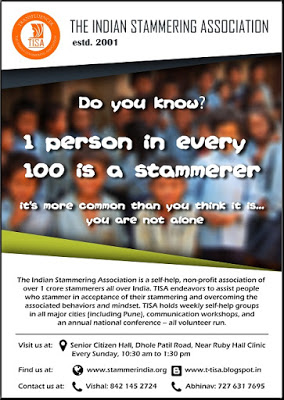
After a 15 minute ride, we reached the school. From Sachin Sir’s prior experience, we assumed that the Principal of the school might resist allowing us, but she was very supportive and we soon found out why. Most of the kids in the municipality school were highly underprivileged compared to the schools we attended as kids, so, the staff were willing to do anything possible to help them. We entered the first classroom and all the kids greeted us by standing up and saying, “Good Afternoon Sir, Have a nice day Sir.” It reminded me of my school days…eh. We interacted with the teacher first. Some of the things which we told to the teacher were,
- Who are we
- What does our organization do
- Why we don’t charge money
- What are the myths society has formed about stammering
- How to handle someone who stammers while speaking
- How not to behave with or treat someone who stammers

During interactions with every teacher, we handed our visiting cards and handouts to them without fail and requested them to spread the message to anyone they knew who stammers. Then we requested them to allow us to interact with the students.

Standing in front of those kids, I remembered the quote by Mark Twain, “The secret to getting ahead is getting started.” So I was trying to start speaking looking all calm on the outside, although there was chaos inside my mind regarding what to speak to those kids who were looking up to me in hopes of learning something new. When speaking to kids, you have to remember that they have a very active mind, and so they get distracted very easily unless you manage to grab and hold their attention. This, I know, since I was the most distracted kid in the entire class, maybe the entire school, who daydreamed sitting in lectures. So, I tried to engage them by asking them about movies. The entire conversation went something like this
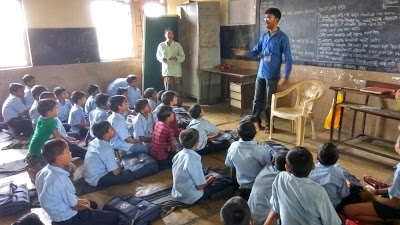
(translated in English)…
Me: Does everyone understands Hindi?
Kids: Yes (some No)Me: (again, louder than before) Does everyone understands Hindi?
Kids: (loudly) YesMe: OK kids, tell me, who watches movies?
(some kids raise hands, some don’t)Me: How many of you have seen Golmaal 3?
(some hands go down, some who were down till now suddenly rise up)Me: So kids, do you remember there was a character in that movie who used to speak like (Making funny face) A..gh…gh…gh…ghhhhh…
Kids: Yes!
Me: What you saw in that movie was just acting, but do you know, that the problem portrayed there is actually real. It is called stammering. Millions of people suffer from it. In fact it is so common, that if you gather 100 people at a same place, you will get at least 1 person who stammers from among them.
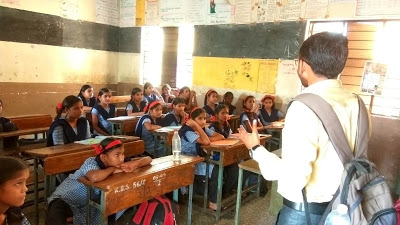
After this I told them about my own story and how I suffered from stammering all those years. I told them that stammering is completely normal and you should not be ashamed of it. In fact, if you encounter someone who stammers, then encourage them to speak and listen to them patiently.
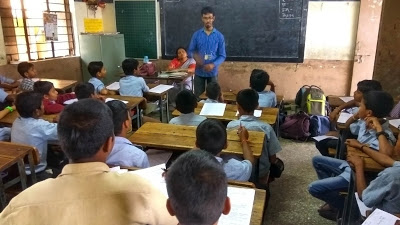
We asked the teachers and kids if they knew anyone who stammers and requested them to convey our message and contact details to all those who stammer. We even called some kids who themselves or others believed that they stammer and interacted with them. By the time the school ended, we visited 8 classes ranging from 5th grade to 7th grade and interacted with the kids at each class we went. We took turns while speaking to the kids and by the end of the day, were completely exhausted. As we left the school building, we were greeted by the same kids we visited in the past few hours who were saying, “Bye Bye Sir!.” Even though it was a challenging step for us, now that we have done it, I can say it was just another step towards acceptance.
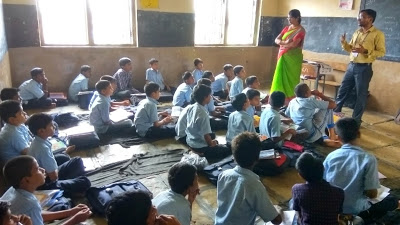
![]()

This story brightened my day. Thank you both for being such wonderful advocates and speaking for those that may not otherwise have the opportunity. I also love how you very purposely engaged the children, it seems like you were both the stars of the school!
Do you only speak at schools or do you present to adult populations as well? If so, do you see a difference in the levels of acceptance or reactions between the two?
Hey Emaier,
Thanks so much for taking the time to read and share your comment. We really apologize for late response you.
Abhinav’s response:
We speak in front of all types of audiences, wherever and whenever we get an opportunity.
In case of kids, what we have seen is that they have a high level of curiosity, and, if someone can successfully engage their attention, they listen carefully and understand stammering and the problems associated with it very quickly. We proved this when we spoke to many kids about Stammering in an acting class and asked them to share their views.
In case of adults, it’s an entirely different scenario. Usually, we encounter following types of adults:
Type 1: The “I can relate” people.
This type of person is someone who himself stammerers or who knows someone who stammerers and has seen them suffer. Usually they are patient and listen carefully to what we say. Sometimes we meet someone who starts boasting about his/her experience with stammering and then starts giving misleading advice.
Type 2: The “I can empathize” people.
This type of person is someone who is kind enough to listen to us but not patient enough to understand us. All they have to offer is “don’t worry, you will get well soon”
Type 3: The “I know everything” people.
This type of person is usually someone who has passed youth. He/She keeps offering their own advice and opinions on Stammering. Interacting with such person is either super annoying or downright hilarious. Mostly such people keep on interrupting a stammerer so we have to ask them to stop speaking and start listening.
These are our personal experiences in every day life. We are very thankful to The Indian Stammering Association to motivate, guide and support us.
I loved your story! I am a speech-language pathology graduate student who is interested in working with individuals who stutter, and I have been thinking a lot about ways I could advocate for these individuals. I think making presentations to classes about stuttering is a wonderful way to advocate. If I ever made a presentation about stuttering to a group of individuals, what do you feel would be the most important points I could make?
Hi Melissa,
Thank you loved reading our story. As you thought that the presentation is the wonderful way of advocacy of children who stutter(cws), it’s very true because it was very useful to us during our project. So as per our opinion and experience, we suggest some important points for making presentation-
1) introduction about stuttering i.e. stuttering is a neuro biological disorder and it’s not a disease so that it can’t be cure through the medicines, etc.
2)some basic information like 1% of world population are pws(person who stutter) so that their feeling of loneliness get reduced.
3) some successful stories in short of eminent pws like Isaac Newton, Winston Churchill, Tiger Woods, Bruce Willis, etc.
4) how acceptance is the key to improve communication.
5) how desensitisation is helpful to reduce their psychological baggage and mental stress.
6) how Self Help Group activities like voluntary stuttering, role plays, impromptu speeches, talking with strangers, etc are helpful to get courage, confidence and communication skills.
7) how to behave with pws/cws by friends, parents, teachers and also strangers.
Abhinav and Vishal – guys, I wish I had met you fifty years ago!
As a child, everyday I looked for one- just ONE- adult who would stammer.. In class rooms, in market, in play ground.. I found none. Alas, I was the only one stammering!! That was so lonely! and painful and pathogenic! Had I met you guys, that would have been the BEST therapy for me!
Anyway, better late than never. Meeting you in Goa was such fun- and let me tell you that both of you are doing what TISA has been suggesting (“discreetly”) for such a long time! Prayers heard!
Lage raho, pyar se,
Haklao bhi pyar se..
Jujho mat apne aap se!
Keep writing and challenging yourself!
Hi Sachin Sir,
We are very grateful to your valuable support and suggestions at every moment of our life. Whole credit goes to you sir and The Indian Stammering Association Pune SHG. We really enjoyed National Conference at goa with you. Now journey to aware cws just started. We will plan to do awareness in local language so that it will reach to all over Maharashtra.
Thank you so much sir.
Hi Abhinav and Vishal,
My name is Haylee and I am a first year graduate student in Speech-Language Pathology. I am currently taking a class in the assessment and treatment of stammering. I think it is great that you went to a school to advocate for individuals who stammer and to also educate the other children in the school about stammering.
I also think it is great that you guys have a group to support those who stammer. We have a similar group at my university. Do you see more adults or children that come to your group? Also did any children from this school end up coming to your group?
Hi Hayley,
I am glad to see that you have a group at your university. Hope you are doing great!!
In our project, our TISA SHG group play an important role in planning, visiting schools,guide and support during workshop. Our SHG group in Pune have approximately 70-80 members. Among that 8-10 members are actively participate in every Sunday.
We create awareness about stammering in schools, trains, gardens, malls,etc. From schools, only one cws attended workshop with his parents. Now we are planning to arrange children workshop in next month for cws.
Thank you.
Warm wishes,
Vishal.
Abhinav and Vishal,
Thank you for sharing. I am a graduate student in Speech-Language Pathology and currently taking a Fluency course. I think it is amazing that you guys are educating children about stuttering/ stammering. In doing so, you are bringing awareness to a topic many people are not familiar with and in turn, with education will come acceptance. This seems to me like a great way to limit bullying. After talking to those classes, where there any CWS who approached you to with questions?
Brittany
Hey Brittany,
Thank you for reading the article. I am agree that it is very helpful to aware people about stammering to limit bullying. There are couple of cws asking their doubts about stammering i. e. how to cure stammering, tell some medicine to cure, how can i reduce my fear, etc. I experienced that cws upto 12 yrs old were free ask questions but more than 12, were not comfortable with us. It’s only because of mindset about people were laughed at me, looking good approach,etc.
Best wishes,
Vishal
Abhinav and Vishal,
Thank you for the work you are doing! I am also a graduate SLP student enrolled in a fluency course. I plan to work in a school setting and hope to be able to help CWS someday. Like Brittany said before me, I think that speaking to classrooms is a great way to spread awareness and decrease bullying. Do you think it makes a difference who the children hear this message from? Is it more impactful if an adult who stutters delivers this message?
Thank you,
Whitney
Hi Whitney,
As I mentioned earlier in Brittany’s reply, it’s very true that awareness about stammering decrease bullying. I like your question. As per experienced in school, it really makes difference. Because, cws will attach soon by seeing similar impediment to pws. They will touch and inspire by seeing his courage, confidence and pride about stammering. So cws will also try speaking with courage and pride. Also when non cws see the example of pws in front of them, they will connect to the subject soon by seeing his courage, smile on face and valuable information.
Warm wishes,
Vishal
Abhinav and Vishal,
What a great article! It is so great to hear that awareness is being spread throughout the world. I am studying Speech Language Pathology, and I am very interested in someday working with children who stutter. I will actually be presenting to a group of fifth grade students to raise awareness of stuttering in a few weeks.
I was looking at your website and saw that your organization provides self-help groups. That is such a great resource. Do your meetings have high attendance rates? It takes a lot of courage to stand up in front of eight classes, so you should be proud of your accomplishments!
Thank you for sharing,
Emma
Hi Emma,
I am very glad to loved reading our article. As you saw on our website, SHG is the great platform for any pws. It is very helpful to reduce fear, psychological baggage and develop stage daring, courage, acceptance,etc. It’s only because of the various activities of TISA SHG.
Regarding attendance in SHG meeting, it is vary in every meeting. So every meeting have approximately 5-10 pws. In India; Delhi, Mumbai, Pune, Bangalore, Chennai and Jaipur SHGs are actively participate.
So thank you so much Emma and hope you are doing great in your interest.
Best wishes,
Vishal.
Hello Mr. Bakshi and Mr. Yewale,
I am a graduate student in speech-language pathology and am currently taking a class on stuttering. I found your story to be very inspiring. It is particularly important to inform people about stuttering and how it is normal and not something to be ashamed of, so it is wonderful how you are raising awareness for stuttering. Thank you for sharing your story!
Katie
Hey Katie,
I am very happy to see you inspired reading our story. It is very necessary to create awareness about stammering in all over the world. We are just contributing towards it.
Hope you are also doing great!!
Thank you so much.
Vishal.